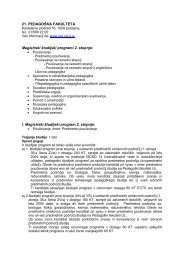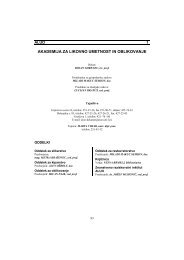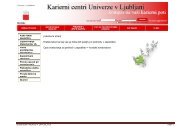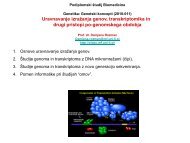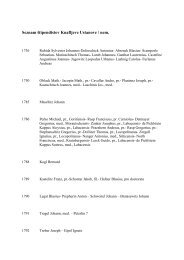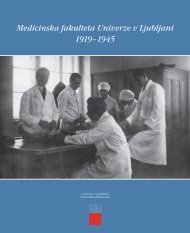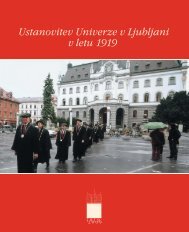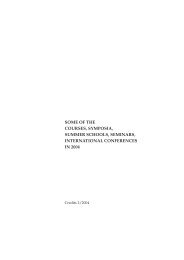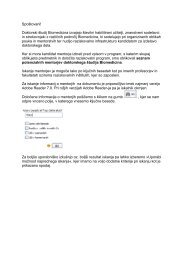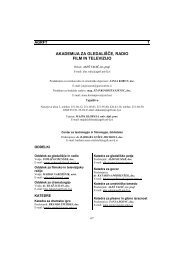10 Interdisciplinary Doctoral Programme in STATISTICS - Univerza v ...
10 Interdisciplinary Doctoral Programme in STATISTICS - Univerza v ...
10 Interdisciplinary Doctoral Programme in STATISTICS - Univerza v ...
Create successful ePaper yourself
Turn your PDF publications into a flip-book with our unique Google optimized e-Paper software.
<strong>Interdiscipl<strong>in</strong>ary</strong> <strong>Doctoral</strong><br />
<strong>Programme</strong> <strong>in</strong> Statistics<br />
Ljubljana, 2012
<strong>Interdiscipl<strong>in</strong>ary</strong> <strong>Doctoral</strong><br />
<strong>Programme</strong> <strong>in</strong> Statistics<br />
Text: prof. dr. Katja Breskvar,<br />
Sergeja Mitič<br />
Design: Dejan Šuc<br />
Pr<strong>in</strong>t: Kubelj d.o.o.<br />
Pr<strong>in</strong>t run: 60 copies<br />
Ljubljana 2012
Table of Contents<br />
Introduction 4<br />
1. The programme 5<br />
2. Basic programme goals and general competences 6<br />
3. Expected number of doctoral candidates 6<br />
4. Admission requirements and criteria for selection 7<br />
4.1. Admission requirements 7<br />
4.2. Criteria for selection of candidates 7<br />
4.3. Mentor 7<br />
5. Recognition of knowledge and skills acquired before admission to the programme 8<br />
6. Requirements for progression through the programme 8<br />
7. Conditions for complet<strong>in</strong>g the programme and the doctoral degree 9<br />
7.1. <strong>Doctoral</strong> thesis 9<br />
7.2. Conditions for complet<strong>in</strong>g the programme 9<br />
7.3. <strong>Doctoral</strong> diploma 9<br />
8. Transfer between study programmes <strong>10</strong><br />
9. Grad<strong>in</strong>g system <strong>10</strong><br />
<strong>10</strong>. Career Prospects <strong>10</strong><br />
11. <strong>Programme</strong> Council and module co-ord<strong>in</strong>ators 11<br />
12. <strong>Programme</strong> 12<br />
12.1. Content and structure of the programme (by year) 12<br />
13. L<strong>in</strong>ks to other study programmes 12<br />
14. Course presentation 13<br />
14.1. Obligatory core courses 13<br />
14.2. Elective courses 13<br />
15. Organisation 15<br />
<strong>Interdiscipl<strong>in</strong>ary</strong> <strong>Doctoral</strong> <strong>Programme</strong> <strong>in</strong> <strong>STATISTICS</strong> | Table of Contents
Introduction<br />
Advanced knowledge of statistics is of significant importance <strong>in</strong> science and is the foundation for research <strong>in</strong> practically<br />
all academic discipl<strong>in</strong>es. At the same time, advanced experts <strong>in</strong> statistics are sought by various services, from state<br />
adm<strong>in</strong>istration to research departments <strong>in</strong> different companies.<br />
In the past decades, statistics as an <strong>in</strong>dependent scientific discipl<strong>in</strong>e has made enormous contribution to science<br />
and society. It has become a tool applicable <strong>in</strong> diverse fields such as agriculture, biology, bus<strong>in</strong>ess and economics,<br />
education, eng<strong>in</strong>eer<strong>in</strong>g, law, medic<strong>in</strong>e, the military, public adm<strong>in</strong>istration, social sciences, etc.<br />
In the past few years University of Ljubljana organised <strong>in</strong>terdiscipl<strong>in</strong>ary masters/doctoral programme <strong>in</strong> the field of<br />
statistics which was very well accepted by the users. The programme was organised and carried out by lecturers from<br />
the Biotechnical Faculty, Faculty of Economics, Faculty of Mathematics and Physics, Faculty of Medic<strong>in</strong>e and Faculty<br />
of Social Sciences. The experience ga<strong>in</strong>ed <strong>in</strong> this programme was very helpfull <strong>in</strong> prepar<strong>in</strong>g new doctoral programme<br />
as the third cycle of education accord<strong>in</strong>g to Bologna scheme.<br />
On the basis of good experience <strong>in</strong> the past and of the noticeable advantages of the <strong>in</strong>terdiscipl<strong>in</strong>ary approach, the<br />
<strong>Interdiscipl<strong>in</strong>ary</strong> <strong>Doctoral</strong> <strong>Programme</strong> <strong>in</strong> Statistics is also organised at the university level.<br />
The programme offers seven modules: biostatistics, social statistics, mathematical statistics, economics and bus<strong>in</strong>ess<br />
statistics, official statistics, psychological statistics and technical statistics.<br />
<strong>Interdiscipl<strong>in</strong>ary</strong> <strong>Doctoral</strong> <strong>Programme</strong> <strong>in</strong> <strong>STATISTICS</strong> | Introduction
The duration of the <strong>Interdiscipl<strong>in</strong>ary</strong> <strong>Doctoral</strong> <strong>Programme</strong> <strong>in</strong> Statistics is three years (180 ECTS credits), and accord<strong>in</strong>g<br />
to the Bologna educational scheme this represents the third cycle of education. The programme consists of organised<br />
classes (60 credits) and <strong>in</strong>dividual research work for the doctoral thesis (120 credits).<br />
<strong>Interdiscipl<strong>in</strong>ary</strong> <strong>Doctoral</strong> <strong>Programme</strong> <strong>in</strong> Statistics is evaluated accord<strong>in</strong>g to the European Credit Transfer System<br />
(ECTS), thus allow<strong>in</strong>g students and lecturers to participate <strong>in</strong> <strong>in</strong>ternational exchange schemes <strong>in</strong> the countries where<br />
ECTS or some other comparable system is implemented.<br />
The doctoral programme results <strong>in</strong> the degree of Doctor of Science and consists of seven modules:<br />
• Biostatistics<br />
• Statistics for Social Sciences<br />
• Mathematical Statistics<br />
• Economics and Bus<strong>in</strong>ess Statistics<br />
• Official Statistics<br />
• Psychological Statistics<br />
• Technical Statistics<br />
The programme is organised by the University of Ljubljana through its faculties:<br />
• Biotechnical Faculty<br />
• Faculty of Arts<br />
• Faculty of Economics<br />
• Faculty of Electrical Eng<strong>in</strong>eer<strong>in</strong>g<br />
• Faculty of Mathematics and Physics<br />
• Faculty of Medic<strong>in</strong>e<br />
• Faculty of Social Sciences<br />
The programme 1<br />
<strong>Interdiscipl<strong>in</strong>ary</strong> <strong>Doctoral</strong> <strong>Programme</strong> <strong>in</strong> <strong>STATISTICS</strong> | The programme
2<br />
Basic programme goals<br />
and general competences<br />
The ma<strong>in</strong> goal of the <strong>Interdiscipl<strong>in</strong>ary</strong> <strong>Doctoral</strong> <strong>Programme</strong> <strong>in</strong> Statistics is to further educate experts who have<br />
some fundamental knowledge <strong>in</strong> statistical theory, some experience <strong>in</strong> the field of statistics or some general statistical<br />
knowledge, specific to an <strong>in</strong>dividual science discipl<strong>in</strong>e. <strong>Doctoral</strong> candidates should ga<strong>in</strong> the capability of scientific<br />
th<strong>in</strong>k<strong>in</strong>g and solv<strong>in</strong>g new problems <strong>in</strong> various scientific fields.<br />
After completion of their studies the doctoral graduates will be qualified for creative and <strong>in</strong>dependent research<br />
work and for solv<strong>in</strong>g statistical problems of future employers. In the specific scientific field they will be able to<br />
form def<strong>in</strong>itions of research problems and f<strong>in</strong>d optimal solutions. They will be capable to l<strong>in</strong>k together the exist<strong>in</strong>g<br />
methods, develop new methods with critical approach and clearly def<strong>in</strong>ed criteria based on statistical theory. They will<br />
be able to critically assess research results and capable to transferr<strong>in</strong>g new knowledge <strong>in</strong>to practice. Due to dist<strong>in</strong>ct<br />
<strong>in</strong>ternational orientation of the programme, they will acquire the ability to communicate <strong>in</strong> an <strong>in</strong>ternational scientific<br />
environment.<br />
Expected number of doctoral candidates<br />
Up to 20 candidates are expected to be enroled each year.<br />
<strong>Interdiscipl<strong>in</strong>ary</strong> <strong>Doctoral</strong> <strong>Programme</strong> <strong>in</strong> <strong>STATISTICS</strong> | Basic programme goals and general competences, Expected number of doctoral candidates
4.1. Admission requirements<br />
For admission to the <strong>Interdiscipl<strong>in</strong>ary</strong> <strong>Doctoral</strong> <strong>Programme</strong> <strong>in</strong> Statistics graduates of the follow<strong>in</strong>g programmes are<br />
<strong>in</strong>vited:<br />
• Second cycle study programmes;<br />
• Study programmes provid<strong>in</strong>g education for occupations regulated by Directives of the European Union<br />
(93/16/EEC for doctors, 78/<strong>10</strong>27/EEC for veter<strong>in</strong>arians, 78/687/EEC for dentists and 85/432/EEC for<br />
pharmacists) evaluated with at least 300 credits;<br />
• Study programmes lead<strong>in</strong>g to specialisation, provided that candidates have previously completed<br />
a higher education professional study programme. The Statistics <strong>Programme</strong> Council will specify additional<br />
entry requirements for candidates <strong>in</strong> <strong>in</strong>dividual areas amount<strong>in</strong>g from 30 to 60 credits;<br />
• Study programmes lead<strong>in</strong>g to a master of science or to specialisation after complet<strong>in</strong>g a university<br />
study programme. 60 credits of study obligations will be recognised to such candidates;<br />
• Academic study programmes.<br />
Candidates with foreign qualifications are required to apply for recognition of their entry qualifications. Applications<br />
should be submitted at the same time as applications to the programme, but separately submitted to the <strong>Univerza</strong> v<br />
Ljubljani, Kongresni trg 12, Ljubljana, Slovenija.<br />
4.2. Criteria for selection of candidates<br />
The selection of candidates is particularly at issue when the number of candidates significantly exceeds the number of<br />
places offered. Selection will be primarily based on the candidate’s level of achievement <strong>in</strong> previous studies.<br />
4.3. Mentor<br />
Admission requirements and criteria<br />
for selection<br />
Prior to the enrolment to the programme candidates are requested to choose the mentor who will agree to supervise<br />
their research work.<br />
<strong>Interdiscipl<strong>in</strong>ary</strong> <strong>Doctoral</strong> <strong>Programme</strong> <strong>in</strong> <strong>STATISTICS</strong> | Admission requirements and criteria for selection
Recognition of knowledge and skills acquired<br />
before admission to the programme<br />
Knowledge and skills obta<strong>in</strong>ed through formal and <strong>in</strong>formal learn<strong>in</strong>g and experience obta<strong>in</strong>ed before enrolment to the<br />
programme will be taken <strong>in</strong>to consideration when mak<strong>in</strong>g a selection for the limited number of places. The knowledge<br />
and skills of candidates obta<strong>in</strong>ed before entry will be recognized by the <strong>Programme</strong> Council <strong>in</strong> accordance with the<br />
Rules of the University of Ljubljana on procedures and measures on recognis<strong>in</strong>g <strong>in</strong>formally obta<strong>in</strong>ed knowledge and<br />
skills, and on the basis of written application of the candidates.<br />
Requirements for progression<br />
through the programme<br />
To progress from the first to the second year of the study, doctoral candidates need to accumulate two obligatory and<br />
at least one elective course and need to accumulate <strong>in</strong> total at least 45 credit po<strong>in</strong>ts.<br />
The candidates of the module Mathematical Statistics need to take a doctoral exam, which replaces presentation of<br />
the theme of the doctoral thesis on other modules <strong>in</strong> the second year of study. The successfully passed doctoral exam<br />
is the requirement to enrol <strong>in</strong>to the third year of study.<br />
The candidates take the doctoral exam from two courses:<br />
(A) Mathematical Statistics<br />
(B) course selected by the candidate from the list: F<strong>in</strong>ancial mathematics, Numerical methods <strong>in</strong> f<strong>in</strong>anc<strong>in</strong>g and<br />
economics, Mathematical methods <strong>in</strong> risk theory, Selected chapters from f<strong>in</strong>ancial mathematics, Bayesian methods<br />
<strong>in</strong> statistics, Accidental processes. These subjects are taught at the Doctorate course at Faculty of Mathematics and<br />
Physics.<br />
Candidates, who have completed all organised study requirements <strong>in</strong> the first and the second year (<strong>in</strong>clud<strong>in</strong>g successful<br />
presentation of the theme of the doctoral thesis or doctoral exam (<strong>in</strong> the mathematical statistics)) and have the approval<br />
of proposed doctoral thesis by the University Senate, are permitted to enter the third year of doctoral study.<br />
<strong>Interdiscipl<strong>in</strong>ary</strong> <strong>Doctoral</strong> <strong>Programme</strong> <strong>in</strong> <strong>STATISTICS</strong> | Recognition of knowledge and skills acquired before admission to the programme, Requirements for progression through the programme
7.1. <strong>Doctoral</strong> thesis<br />
The registration of topic, the nom<strong>in</strong>ation of an academic advisor - mentor, as well as the nom<strong>in</strong>ation of an expert<br />
committee for evaluation of a doctoral thesis and graduation committee, are <strong>in</strong> the doma<strong>in</strong> of the faculty senate<br />
responsible for a given study module. The Senate of the University of Ljubljana approves of the topic of the doctoral<br />
thesis and the proposed academic advisor(s).<br />
7.2. Conditions for complet<strong>in</strong>g the programme<br />
The condition for complet<strong>in</strong>g the programme and acquir<strong>in</strong>g the doctoral degree is the successful completion of all<br />
study requirements def<strong>in</strong>ed by the programme and the successful defence of the doctoral thesis. The doctoral candidate<br />
must publish at least one scientific article based on the research presented <strong>in</strong> the doctoral thesis <strong>in</strong> a scientific journal<br />
<strong>in</strong>dexed by the SCI or SSCI. The article with the candidate’s name listed as first author must be published or accepted<br />
for publication prior to the defence of the doctoral thesis.<br />
7.3. <strong>Doctoral</strong> diploma<br />
Conditions for complet<strong>in</strong>g<br />
the programme and the doctoral degree<br />
After fulfillment of all study requirements the diploma jo<strong>in</strong>tly signed by the Rector of the University of Ljubljana<br />
and the dean of the responsible faculty is awarded to the candidates by the University of Ljubljana. <strong>Doctoral</strong> diploma<br />
is awarded by the Rector of the University of Ljubljana. Graduates of the <strong>Interdiscipl<strong>in</strong>ary</strong> <strong>Doctoral</strong> <strong>Programme</strong> <strong>in</strong><br />
Statistics receive the title »Doctor of Science«.<br />
<strong>Interdiscipl<strong>in</strong>ary</strong> <strong>Doctoral</strong> <strong>Programme</strong> <strong>in</strong> <strong>STATISTICS</strong> | Conditions for complet<strong>in</strong>g the programme and the doctoral degree
<strong>10</strong> <strong>Interdiscipl<strong>in</strong>ary</strong><br />
Transfer between study programmes<br />
Transfer between doctoral programmes is possible if candidates fulfil the access requirements of the programme.<br />
Applications for transfer of such candidates to <strong>Interdiscipl<strong>in</strong>ary</strong> <strong>Doctoral</strong> <strong>Programme</strong> <strong>in</strong> Statistics will be treated<br />
<strong>in</strong>dividually by the <strong>Programme</strong> Council <strong>in</strong> accordance with the University Statute.<br />
Grad<strong>in</strong>g system<br />
In accordance with the Statute of the University of Ljubljana, exam<strong>in</strong>ation results are graded from 1 to <strong>10</strong>, whereby<br />
positive pass grades range from 6 to <strong>10</strong>. Accord<strong>in</strong>g to the programme, exams will be written and oral. Sem<strong>in</strong>ars and<br />
projects are also graded. The exam<strong>in</strong>ations <strong>in</strong> doctoral programs may also be graded as not passed, passed and passed<br />
with honors.<br />
<strong>10</strong> Career Prospects<br />
The possibilities for employment of graduates from the <strong>Interdiscipl<strong>in</strong>ary</strong> <strong>Doctoral</strong> <strong>Programme</strong> <strong>in</strong> Statistics are<br />
very diverse. They are suitable for employment as experts or as important new personnel at universities and other<br />
educational or research <strong>in</strong>stitutions. They can also work <strong>in</strong> public adm<strong>in</strong>istration (especially at the Statistical Office<br />
of the Republic of Slovenia) and <strong>in</strong> private research companies (active <strong>in</strong> the fields of market research, development<br />
plann<strong>in</strong>g, stock management, statistical quality control, etc.). <strong>Doctoral</strong> graduates <strong>in</strong> the field of statistics are needed<br />
<strong>in</strong> various expert services, <strong>in</strong> many fields of government adm<strong>in</strong>istration and <strong>in</strong> research departments of different<br />
companies. They can act <strong>in</strong> various research teams <strong>in</strong> most academic fields and thereby importantly contribute to the<br />
quality of research work <strong>in</strong> Slovenia and <strong>in</strong>ternationally as well.<br />
<strong>Doctoral</strong> <strong>Programme</strong> <strong>in</strong> <strong>STATISTICS</strong> | Transfer between study programmes, Grad<strong>in</strong>g system, Career Prospects
Organisation and implementation of the programme is co-ord<strong>in</strong>ated by the <strong>Programme</strong> Council, consist<strong>in</strong>g of one<br />
representative from each of the co-operat<strong>in</strong>g faculty. Additional council members are the module co-ord<strong>in</strong>ators.<br />
Members of the <strong>Programme</strong> Council and module co-ord<strong>in</strong>ators are proposed by the faculty senates and approved by<br />
University Senate for a period of four years.<br />
The <strong>Programme</strong> Council is chaired by the chairman, or - <strong>in</strong> case of the president’s absence - deputy chairman. Both<br />
of them are elected from and by the members of the <strong>Programme</strong> Council for a period of four years. The seat of the<br />
<strong>Programme</strong> Council is at the University of Ljubljana.<br />
Members of the <strong>Programme</strong> Council:<br />
1. Prof. Dr. Katar<strong>in</strong>a Košmelj, Biotechnical Faculty<br />
E-Mail: katar<strong>in</strong>a.kosmelj@bf.uni-lj.si<br />
2. Assist. Prof. Dr. Gregor Sočan, Faculty of Arts<br />
E- Mail: gregor.socan@ff.uni-lj.si<br />
3. Prof. Dr. Marko Pahor, Faculty of Economics<br />
E-Mail: marko.pahor@ef.uni-lj.si<br />
4. Prof. Dr. Gregor Dol<strong>in</strong>ar, Faculty of Electrical Eng<strong>in</strong>eer<strong>in</strong>g<br />
E-Mail: gregor.dol<strong>in</strong>ar@fe.uni-lj.si<br />
5. Prof. Dr. Matjaž Omladič, Faculty of Mathematics and Physics<br />
E-Mail: matjaz.omladic@fmf.uni-lj.si<br />
6. Prof. Dr. Janez Stare, Faculty of Medic<strong>in</strong>e<br />
E-Mail: janez.stare@mf.uni-lj.si<br />
7. Prof. Dr. Anuška Ferligoj, Faculty of Social Sciences<br />
E-Mail: anuska.ferligoj@fdv.uni-lj.si<br />
Module co-ord<strong>in</strong>ators:<br />
1. Prof. Dr. Andrej Blejec, National Institute of Biology, module »Biostatistics«<br />
E-Mail: andrej.blejec@nib.si<br />
2. Assist. Prof. Dr. Gregor Sočan, Faculty of Arts, module »Psychological Statistics”<br />
E-Mail: gregor.socan@ff.uni-lj.si<br />
3. Prof. Dr. Irena Ograjenšek, Faculty of Economics, module »Official Statistics”<br />
E-Mail: irena.ograjensek@ef.uni-lj.si<br />
<strong>Programme</strong> Council<br />
and module co-ord<strong>in</strong>ators 11<br />
4. Prof. Dr. Jože Rovan, Faculty of Economics, module »Economics and Bus<strong>in</strong>ess Statistics«<br />
E-Mail: joze.rovan@ef.uni-lj.si<br />
5. Prof. Dr. Gregor Dol<strong>in</strong>ar, Faculty of Electrical Eng<strong>in</strong>eer<strong>in</strong>g, module »Technical Statistics«<br />
E-Mail: gregor.dol<strong>in</strong>ar@fe.uni-lj.si<br />
6. Prof. Dr. Matjaž Omladič, Faculty of Mathematics and Physics, module »Mathematical Statistics«<br />
E-Mail: matjaz.omladic@fmf.uni-lj.si<br />
7. Assist. Prof. Dr. Aleš Žiberna, Faculty of Social Sciences, module »Statistics for Social Sciences«<br />
E-Mail: ales.ziberna@fdv.uni-lj.si<br />
<strong>Interdiscipl<strong>in</strong>ary</strong> <strong>Doctoral</strong> <strong>Programme</strong> <strong>in</strong> <strong>STATISTICS</strong> | <strong>Programme</strong> Council and module co-ord<strong>in</strong>ators<br />
11
12<br />
1<br />
12 <strong>Interdiscipl<strong>in</strong>ary</strong><br />
<strong>Programme</strong><br />
The programme consists of organised forms of teach<strong>in</strong>g and research. Organised teach<strong>in</strong>g comprises of 60 credits; the<br />
rema<strong>in</strong><strong>in</strong>g 120 credits are <strong>in</strong>tended for research work for elaboration of the doctoral thesis.<br />
12. 1 Content and structure of the programme (by year)<br />
First year:<br />
• obligatory courses (15 credits)<br />
• elective courses (15 credits)<br />
• <strong>in</strong>dividual research work (30 credits)<br />
Total 60 credits<br />
In the first year of study, doctoral candidates, with<strong>in</strong> the framework of obligatory and elective courses, obta<strong>in</strong><br />
fundamental theoretical knowledge and expertise of scientific work.<br />
Second year:<br />
• obligatory module course (15 credits)<br />
• presentation of the theme of the doctoral thesis (5 credits) or doctoral exam (mathematical module)<br />
• <strong>in</strong>dividual research work (40 credits)<br />
Total 60 credits<br />
The second year of study all course work must be completed. The doctoral thesis is presented at the end of the first<br />
semester.<br />
Third year:<br />
• <strong>in</strong>dividual research work (50 credits)<br />
• presentation of the doctoral thesis before the public presentation (5 credits)<br />
• preparation of the doctoral thesis and public defence (5 credits)<br />
Total 60 credits<br />
The focus of the third year is research work, preparation and defence of the doctoral thesis.<br />
L<strong>in</strong>ks to other study programmes<br />
The <strong>Interdiscipl<strong>in</strong>ary</strong> <strong>Doctoral</strong> <strong>Programme</strong> <strong>in</strong> Statistics is both horizontally and vertically l<strong>in</strong>ked to other study<br />
programmes at the University of Ljubljana. Horizontal exchange enables students to fulfil their elective course<br />
requirements from other doctoral programmes at the University of Ljubljana <strong>in</strong> agreement with their mentors and<br />
course lecturers. The vertical l<strong>in</strong>k is <strong>in</strong>herent <strong>in</strong> the very design of the study programme through its syllabus and the<br />
possibilities of choos<strong>in</strong>g different courses. Furthermore, it is possible to exchange study courses with comparable<br />
programmes from other universities, <strong>in</strong>clud<strong>in</strong>g distance learn<strong>in</strong>g programmes. The quality and comparability of<br />
courses must be evaluated by the <strong>Programme</strong> Council. International exchange takes place on the basis of <strong>in</strong>ternational<br />
contracts and bilateral agreements.<br />
International exchange is also possible through collaboration <strong>in</strong> mobility programmes for students and professors. The<br />
programme is also open to foreign students.<br />
<strong>Doctoral</strong> <strong>Programme</strong> <strong>in</strong> <strong>STATISTICS</strong> | <strong>Programme</strong>, L<strong>in</strong>ks to other study programmes
14.1. Obligatory core courses<br />
Each student must complete three obligatory core courses. Modern Statistical Approach is obligatory for all the<br />
students. Mathematical Statistics is obligatory for mathematical module students, and Methodology of Statistical<br />
Research is obligatory for all other students. Students select another obligatory course from the courses <strong>in</strong> the Selected<br />
Topics (on relevant module).<br />
Name of the course Course coord<strong>in</strong>ator ECTS<br />
Modern Statistical Approaches (obligatory course for all) Anuška Ferligoj <strong>10</strong><br />
Methodology of Statistical Research (obligatory course for<br />
all modules except for the mathematical)<br />
Mathematical Statistics (obligatory course for mathematical<br />
module and an optional for the rest)<br />
Selected Topics <strong>in</strong> Social Science Statistics (obligatory course<br />
for social science module)<br />
Selected Topics <strong>in</strong> Biostatistics (obligatory course for<br />
biostatistics module)<br />
Selected Topics <strong>in</strong> Economics and Bus<strong>in</strong>ess Statistics<br />
(obligatory course for economic and bus<strong>in</strong>ess module)<br />
Selected Topics <strong>in</strong> Official Statistics (obligatory course for<br />
official module)<br />
Selected Topics <strong>in</strong> Mathematical statistics (obligatory course<br />
for mathematical module)<br />
Selected Topics <strong>in</strong> Psychological Statistics (obligatory course<br />
for psychological module)<br />
Selected Topics <strong>in</strong> Technical Statistics (obligatory course for<br />
technical module)<br />
14.2. Elective courses<br />
Course presentation 1<br />
Mihael Perman 5<br />
Matjaž Omladič 5<br />
Vasja Vehovar 15<br />
Janez Stare 15<br />
Jože Rovan 15<br />
Lea Bregar 15<br />
Matjaž Omladič 15<br />
Gregor Sočan 15<br />
Tomaž Slivnik 15<br />
The candidates are free to choose between 24 elective courses worth 5 ECTS from the list below. They are allowed to<br />
select <strong>10</strong> ECTS from elective courses from other doctoral programmes at the University of Ljubljana and comparable<br />
programmes of foreign universities. The selected courses must be approved by the mentor and the module coord<strong>in</strong>ator.<br />
Elective credits can be selected also from the university pool of the generic skills courses, listed at the web site of the<br />
University of Ljubljana.<br />
For the module <strong>in</strong> Mathematical Statistics candidates are obliged to choose one course from the list of elective<br />
courses <strong>in</strong> the <strong>Interdiscipl<strong>in</strong>ary</strong> <strong>Doctoral</strong> <strong>Programme</strong> <strong>in</strong> Statistics, except the course Mathematical Statistics and the<br />
courses <strong>in</strong>tended for non-mathematicians (marked by * <strong>in</strong> the table) and two elective courses offered at the Faculty<br />
Interdiscipl<strong>in</strong>arni doktorski študijski program Statistika | Course presentation<br />
1
<strong>10</strong><br />
1<br />
of Mathematics and Physics, Department of Mathematics. The list of courses <strong>in</strong>cludes: F<strong>in</strong>ancial mathematics,<br />
Numerical methods <strong>in</strong> f<strong>in</strong>anc<strong>in</strong>g and economics, Mathematical methods <strong>in</strong> risk theory, Selected chapters from<br />
f<strong>in</strong>ancial mathematics, Bayesian methods <strong>in</strong> Statistics, Accidental processes.<br />
<strong>Interdiscipl<strong>in</strong>ary</strong> <strong>Doctoral</strong> <strong>Programme</strong> <strong>in</strong> <strong>STATISTICS</strong> | Course presentation<br />
Name of the course Course coord<strong>in</strong>ator ECTS<br />
Categorical Data Analysis Jože Rovan 5<br />
Customer Data Analysis Irena Ograjenšek 5<br />
Data M<strong>in</strong><strong>in</strong>g Blaž Zupan 5<br />
Data M<strong>in</strong><strong>in</strong>g and Knowledge Discovery Nada Lavrač 5<br />
Demography, Analysis and Models Janez Malačič 5<br />
Design and Analysis of Experiments Katar<strong>in</strong>a Košmelj 5<br />
Econometric Analysis of Panel Data Sašo Polanec 5<br />
Environmental Statistics Marko Pahor 5<br />
Internet Mediated Research Vasja Vehovar 5<br />
L<strong>in</strong>ear Algebra for Multivariate Methods * Damjana Kokol Bukovšek 5<br />
Modern Psychometric Test Theory Gregor Sočan 5<br />
Multivariate Analysis Anuška Ferligoj 5<br />
Network Analysis Vladimir Batagelj 5<br />
Network Analysis <strong>in</strong> Bus<strong>in</strong>ess and Economics Marko Pahor 5<br />
Reliability and Life Test<strong>in</strong>g Gregor Dol<strong>in</strong>ar 5<br />
Research Challenges of National Accounts Ivo Lavrač 5<br />
Statistical Background of Bio<strong>in</strong>formatics Andrej Blejec 5<br />
Statistical Comput<strong>in</strong>g Andrej Blejec 5<br />
Statistical Quality Control Irena Ograjenšek 5<br />
Stochastic Processes * Matjaž Omladič 5<br />
Survey Methodology Vasja Vehovar 5<br />
Technical Statistics Gregor Dol<strong>in</strong>ar 5<br />
Theory of Index Numbers Lea Bregar 5<br />
Times Series Econometrics Igor Masten 5
The <strong>in</strong>terdiscipl<strong>in</strong>ary <strong>Doctoral</strong> <strong>Programme</strong> <strong>in</strong> Statistics adheres to pr<strong>in</strong>ciples of Rules and Regulations on <strong>Doctoral</strong><br />
Studies deal<strong>in</strong>g with its mode and implementation as follows:<br />
1. University of Ljubljana publishes the call for enrolment <strong>in</strong>to the <strong>Doctoral</strong> <strong>Programme</strong> <strong>in</strong> Statistics. Call for<br />
enrolment has to adhere to the Statute of the University of Ljubljana and <strong>in</strong>cludes guidel<strong>in</strong>es for module selection as<br />
well as <strong>in</strong>formation on available number of study places.<br />
2. The applications are collected at University of Ljubljana and submitted to the <strong>Programme</strong> Council.<br />
3. Students are obliged to f<strong>in</strong>d an academic advisor, make the decision about the choise of module and courses.<br />
4. The enrolment is <strong>in</strong> the doma<strong>in</strong> of the Faculty of Mathematics and Physics, under the authority of the Rector of<br />
the University of Ljubljana, however, all procedures necessary to obta<strong>in</strong> the doctoral degree are <strong>in</strong> the doma<strong>in</strong> of the<br />
participat<strong>in</strong>g faculties.<br />
5. Upon enrolment <strong>in</strong> the first year of study candidate and the University of Ljubljana sign a contract that regulates<br />
all details of the study.<br />
6. Each participat<strong>in</strong>g faculty takes up the whole responsibility for organisation and implementation of the courses <strong>in</strong><br />
its doma<strong>in</strong>.<br />
7. Registration of topic as well as evaluation of each doctoral thesis are <strong>in</strong> the doma<strong>in</strong> of the faculty senate responsible<br />
for a given study module. The Senate of the University of Ljubljana has to consent to the theme of the doctoral thesis<br />
and the proposed academic advisor(s).<br />
8. University of Ljubljana awards the doctoral diploma to the candidate upon fulfillment of all study requirements.<br />
9. Description of regulatory bodies and decision-mak<strong>in</strong>g process:<br />
Organisation 1<br />
<strong>Programme</strong> Council membership is described <strong>in</strong> Part 11. <strong>Programme</strong> Council’s rights and responsibilities are:<br />
• Review of applications, selection of candidates, notification of responsible faculty as to the names of<br />
selected candidates.<br />
• Preparation of documentation necessary to submit <strong>in</strong> public tenders for funds made available for doctoral<br />
programmes.<br />
• Coord<strong>in</strong>ation of procedures for <strong>in</strong>troduction of new courses and changes <strong>in</strong> the exist<strong>in</strong>g courses and/or modules.<br />
• Analysis of efficiency <strong>in</strong> meet<strong>in</strong>g the planned study programme goals.<br />
• Decision-mak<strong>in</strong>g with regard to <strong>in</strong>dividual candidate applications and questions concern<strong>in</strong>g the doctoral programme.<br />
• Facilitation of co-operation among lecturers.<br />
• Review of course implementation (conducted once every six years) and agreement on measures to be<br />
implemented if necessary.<br />
• Decision-mak<strong>in</strong>g on expert issues.<br />
• Confirmation of rules and regulations concern<strong>in</strong>g f<strong>in</strong>ancial management of the programme.<br />
Module co-ord<strong>in</strong>ators have the follow<strong>in</strong>g rights and responsibilities:<br />
• Facilitation of regular study process.<br />
• On-time schedule preparation.<br />
• Coord<strong>in</strong>ation of work among students, academic advisors and lecturers.<br />
• On-time replacement of absent lecturers (<strong>in</strong> cooperation with relevant participat<strong>in</strong>g <strong>in</strong>stitutions).<br />
• Responsibility for improvement and updat<strong>in</strong>g of core module courses <strong>in</strong> agreement with the <strong>Programme</strong><br />
Council (<strong>in</strong> the process, co-ord<strong>in</strong>ators play an advisory role).<br />
• Responsibility for economic use of lecture halls, sem<strong>in</strong>ar rooms, computer laboratories, equipment, and<br />
stationery.<br />
<strong>Interdiscipl<strong>in</strong>ary</strong> <strong>Doctoral</strong> <strong>Programme</strong> <strong>in</strong> <strong>STATISTICS</strong> | Organisation<br />
1



